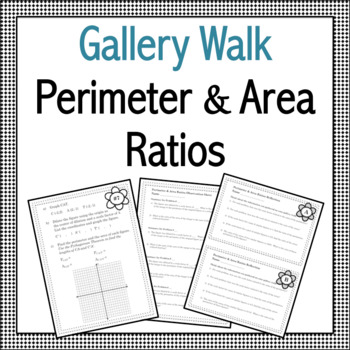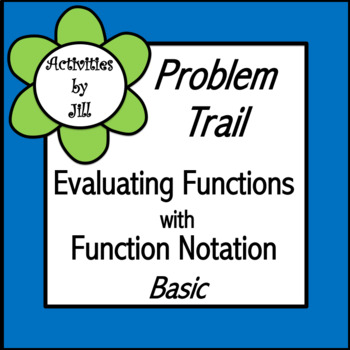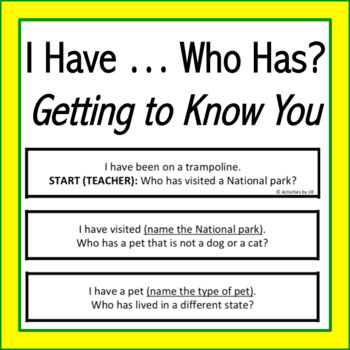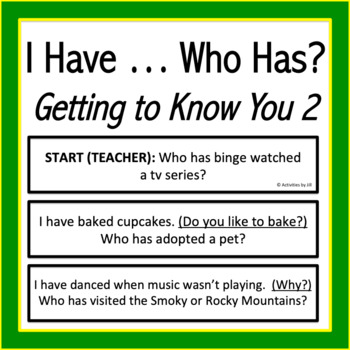It's been a while since I've posted, so here is a new FREE activity I've created for you to use in your algebra classroom.
Problem Trails are great as a way to get students up and moving while keeping a focus on academics. Enjoy!
Sunday, October 13, 2019
Tuesday, January 29, 2019
Gallery Walks in Math Class
Have you tried a gallery walk in your math class?
I admit to having heard of them years ago. However, I've only recently tried one myself. And ... I'm sold!
Students were forced to observe patterns, pay attention to detail, and draw conclusions. (This was not easy for them ... and these were high ability students.)
 I've designed two gallery walks so far. I used this one about "Perimeter & Area Ratios" with my pre-algebra students.
I've designed two gallery walks so far. I used this one about "Perimeter & Area Ratios" with my pre-algebra students.
I used this "Introduction to Exponential Functions" gallery walk with my Algebra 1 class. Since we barely touch on this topic in this course, I tried to keep it relatively simple and used it after giving introductory notes and practice to present the basic information. (It was appropriate, yet still challenging.)
Multiple, similar problems were posted around the room (or in the hallway). Students were given recording sheets with questions that required them to focus on certain aspects of the problems. They had to recognize patterns and similarities, then use them to deduce/synthesis rules.
Here's what I learned from my two experiences:
• If students solve and check the problems a day or two before you plan to do the gallery walk, things will go more smoothly.
• Of course, it is important that the work is correct. If not, students will have difficulty observing patterns and identifying similarities. (A colleague of mine suggested posting the "answer keys" instead of having students solve the problems. This is a way to save time and be certain that the answers are correct. Whether or not you have students solve the problems you post for the gallery walk really depends on exactly what you want students to achieve from the activity.)
• Lastly, you may look at the gallery walk questions and think that the answers seem relatively obvious. However, your students will probably not feel the same. Remember: They are just learning the material. Also, most students don't practice this type of thinking often so it is challenging for them.
I admit to having heard of them years ago. However, I've only recently tried one myself. And ... I'm sold!
Students were forced to observe patterns, pay attention to detail, and draw conclusions. (This was not easy for them ... and these were high ability students.)
 I've designed two gallery walks so far. I used this one about "Perimeter & Area Ratios" with my pre-algebra students.
I've designed two gallery walks so far. I used this one about "Perimeter & Area Ratios" with my pre-algebra students.I used this "Introduction to Exponential Functions" gallery walk with my Algebra 1 class. Since we barely touch on this topic in this course, I tried to keep it relatively simple and used it after giving introductory notes and practice to present the basic information. (It was appropriate, yet still challenging.)
Multiple, similar problems were posted around the room (or in the hallway). Students were given recording sheets with questions that required them to focus on certain aspects of the problems. They had to recognize patterns and similarities, then use them to deduce/synthesis rules.
Here's what I learned from my two experiences:
• If students solve and check the problems a day or two before you plan to do the gallery walk, things will go more smoothly.
• Of course, it is important that the work is correct. If not, students will have difficulty observing patterns and identifying similarities. (A colleague of mine suggested posting the "answer keys" instead of having students solve the problems. This is a way to save time and be certain that the answers are correct. Whether or not you have students solve the problems you post for the gallery walk really depends on exactly what you want students to achieve from the activity.)
• Lastly, you may look at the gallery walk questions and think that the answers seem relatively obvious. However, your students will probably not feel the same. Remember: They are just learning the material. Also, most students don't practice this type of thinking often so it is challenging for them.
Monday, January 21, 2019
Get to Know Your Students Better
 |
| Clipart credit to Thankful in Third |
As teachers, the list of standards we must cover seems only to grow from year to year. It can be difficult to find time to connect with students. How can you learn more about their lives and interests?
I'm sure we all have "getting to know you" activities in our teacher toolkits. We use them at the beginning of the school year. However, when the first week of school is past, do you ever do anything similar again or do you file those materials away for the next school year?
This summer, I created an "I have ... Who has?" game to use at the beginning of the school year. I was really pleased, and a bit surprised with my students' (8th graders) response.
Here's the thing ...
Although we enjoyed it, I never expected my students to ask if we could do it again.
A semester later, when they asked yet again, I did pull out the game. We enjoyed it just as much and I discovered even more about my students!
What have I learned? Getting to know you activities aren't just for the first week of school.
So, I've just finished creating a second version of the game to use before the end of the year. If you don't use this sort of activity in class, how about trying it during an advisory period or study hall? There is no prep other than printing the slips and cutting them apart.
Try this or a similar activity and enjoy the benefits of knowing your students better! Remember, if they enjoy coming to your class and have a positive relationship with you, they will likely be better behaved. 😉
Saturday, January 12, 2019
Keeping Students Busy Bell to Bell
So, ... you are confident that you have planned a great lesson. Suddenly, you unexpectedly have a few students finishing earlier than expected. "What should I do next?" they ask, as you wonder where your carefully timed plan for the class period went off track.
How can you avoid this issue in the future?
Try these simple, yet effective ideas:
Set up an area in your classroom with activities for early finishers. (See ideas here.)
How can you avoid this issue in the future?
Try these simple, yet effective ideas:
Collect task cards on a variety of topics. They are an easy way to provide both routine and challenging practice with minimal effort on your part.
If only a few students finish quickly, they can be a valuable source of help to you. Ask them if they would like to serve as "student teachers" by helping others. Remind them that as "student teachers" they will want to be to be helpful, but should not provide others with answers.
Subscribe to:
Comments (Atom)






